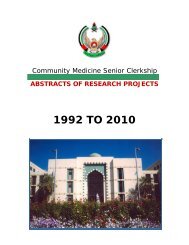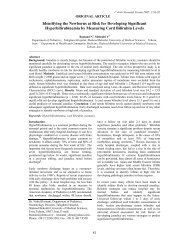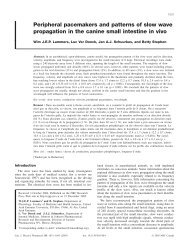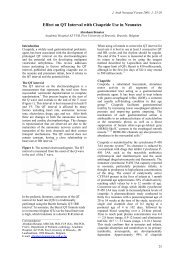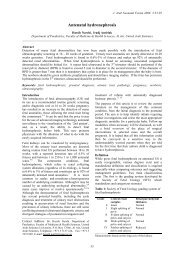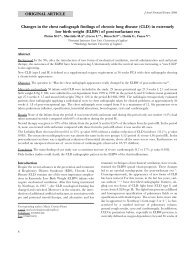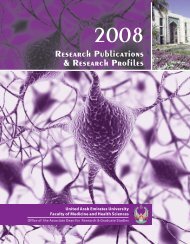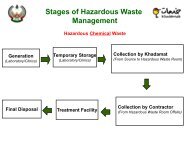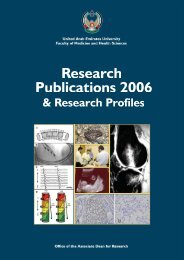Research Publications - College of Medicine and Health Science
Research Publications - College of Medicine and Health Science
Research Publications - College of Medicine and Health Science
You also want an ePaper? Increase the reach of your titles
YUMPU automatically turns print PDFs into web optimized ePapers that Google loves.
Department <strong>of</strong> Biochemistry<br />
10<br />
��������������������������������������<br />
��������������������������������������<br />
Phenomena.<br />
We focused on using complex network analysis<br />
tools to study biological processes such as human<br />
consanguinity <strong>and</strong> congenital disorders,<br />
disease spread in the population using HIV/<br />
AIDS as an example, <strong>and</strong> RNA structure analysis.<br />
These studies have resulted in three MS theses<br />
(two as co-supervisor) <strong>and</strong> one publication.<br />
Sequence comparison <strong>of</strong> MMTV-like fragments amplified out <strong>of</strong> human tissues<br />
compared to MMTV strain Mtv-8 <strong>and</strong> the endogenous human retrovirus HERV-K.<br />
Overall, these sequences revealed over 90% homology with MMTV, but less<br />
than 50% homology with HERV-K. Additionally, the various samples showed<br />
slight differences in their sequence between each other, ruling out any possible<br />
contamination with a laboratory strain <strong>of</strong> MMTV or otherwise.<br />
Mechanisms <strong>of</strong> transcriptional regulation by<br />
chromatin-modifying complexes (Dr. A.H.<br />
Al-Marzouqi)<br />
The research in my laboratory is focused on<br />
underst<strong>and</strong>ing the mechanisms <strong>of</strong> action <strong>of</strong> the<br />
protein complexes that regulate gene expression<br />
by modifying the structure <strong>of</strong> chromatin.<br />
In eukaryotes, the compaction <strong>of</strong> DNA into the<br />
nucleus inhibits the access <strong>of</strong> factors to DNA<br />
which leads to the repression <strong>of</strong> many important<br />
cellular processes required for maintenance<br />
<strong>and</strong> growth <strong>of</strong> the cell. To access the DNA <strong>and</strong><br />
the genes, the nucleoprotein structure, called<br />
chromatin, which consists <strong>of</strong> DNA, histones, <strong>and</strong><br />
non-histone proteins needs to be opened up or<br />
altered. This is accomplished as a result <strong>of</strong> DNA<br />
<strong>and</strong> histone modifications or by DNA binding<br />
proteins. Many studies in the past few years<br />
have described conserved protein complexes<br />
whose function is to modulate the access <strong>of</strong><br />
transcription factors to regulatory regions <strong>of</strong><br />
genes relieving chromatin-mediated repression.<br />
The action <strong>of</strong> these complexes that are able to<br />
overcome the repressive effects <strong>of</strong> chromatin is<br />
an important step in the regulation <strong>of</strong> eukaryotic<br />
gene expression.<br />
Specifically, the overall goals <strong>of</strong> my research<br />
are to underst<strong>and</strong> how certain proteins can<br />
regulate gene expression by modifying the<br />
structure <strong>of</strong> chromatin or interacting with its<br />
components. We are interested in how different<br />
types <strong>of</strong> chromatin modifying proteins work<br />
in turning genes on or <strong>of</strong>f. This is an important<br />
question to be addressed since gene regulation<br />
can determine the amount <strong>of</strong> protein production<br />
required for important functions <strong>of</strong> all cells.<br />
This is also important since many subunits <strong>of</strong><br />
these chromatin-modifying proteins in humans<br />
have been implicated in the initiation <strong>of</strong> various<br />
diseases. It is likely that errors in the function <strong>of</strong><br />
these protein complexes can result in alterations<br />
in the life cycle <strong>of</strong> the cell that may lead<br />
to the development <strong>of</strong> cancer. Thus, we are also<br />
interested in studying how chromatin misregulation<br />
contributes to cancer development <strong>and</strong><br />
could be helpful in finding potential cures for it<br />
in the future.<br />
<strong>Research</strong> highlights<br />
The three areas <strong>of</strong> research focus in my laboratory<br />
during 2011 were:<br />
�����������������������������������������������<br />
the various chromatin-modifying complexes.<br />
��������������������������������������������������<br />
dependent chromatin remodeling complexes.<br />
������������������� in vivo functions <strong>of</strong> chromatin<br />
remodelers <strong>and</strong> their roles in gene silencing<br />
Neuro-modulation <strong>of</strong> the immune response<br />
�����������������������������<br />
My main research interest is to investigate the<br />
mechanism by which organophosphorus compounds<br />
(OPCs) modulate the immune response.<br />
It has been well described that the toxic effects<br />
<strong>of</strong> the OPCs are due to inhibition <strong>of</strong> acetylcholinesterase<br />
(AChE) in the central <strong>and</strong> peripheral<br />
nervous systems, with a consequent increase in<br />
the levels <strong>of</strong> the neurotransmitter acetylcholine<br />
(ACh) which leads to cholinergic hyperstimulation.<br />
We have recently demonstrated that<br />
subchronic doses <strong>of</strong> paraoxon, the bioactive<br />
metabolite <strong>of</strong> the OPC parathion, prepared the



